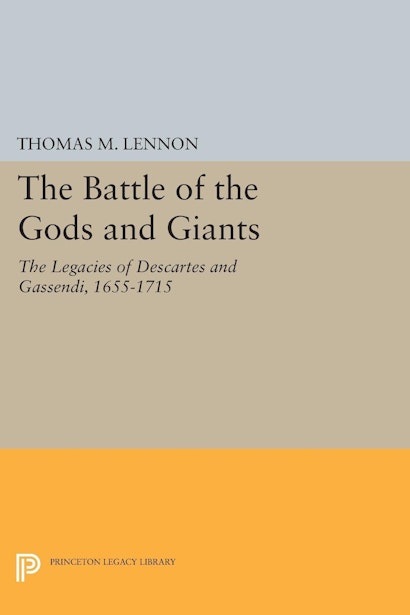The Battle of the Gods and Giants: The Legacies of Descartes and Gassendi, 1655-1715


Hardcover
- Price:
- $182.00/£155.00
- ISBN:
- Published:
- Apr 19, 2016
- Copyright:
- 1993
- Pages:
- 436
- Size:
- 6 x 9 in.
- Main_subject:
- Philosophy
Paperback
ebook
By the mid-1600s, the commonsense, manifest picture of the world associated with Aristotle had been undermined by skeptical arguments on the one hand and by the rise of the New Science on the other. What would be the scientific image to succeed the Aristotelian model? Thomas Lennon argues here that the contest between the supporters of Descartes and the supporters of Gassendi to decide this issue was the most important philosophical debate of the latter half of the seventeenth century. Descartes and Gassendi inspired their followers with radically opposed perspectives on space, the objects in it, and how these objects are known. Lennon maintains that differing concepts on these matters implied significant moral and political differences: the Descartes/Gassendi conflict was typical of Plato’s perennial battle of the gods (friends of forms) and giants (materialists), and the crux of that enduring philosophical struggle is the exercise of moral and political authority.
Lennon demonstrates, in addition, that John Locke should be read as having taken up Gassendi’s cause against Descartes. In Lennon’s reinterpretation of the history of philosophy between the death dates of Gassendi and Malebranche, Locke’s acknowledged opposition to Descartes on some issues is applied to the most important questions of Locke exegesis.
Originally published in 1993.
The Princeton Legacy Library uses the latest print-on-demand technology to again make available previously out-of-print books from the distinguished backlist of Princeton University Press. These editions preserve the original texts of these important books while presenting them in durable paperback and hardcover editions. The goal of the Princeton Legacy Library is to vastly increase access to the rich scholarly heritage found in the thousands of books published by Princeton University Press since its founding in 1905.